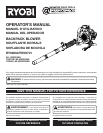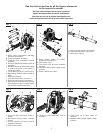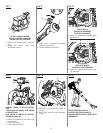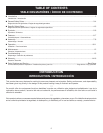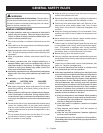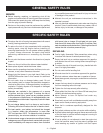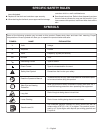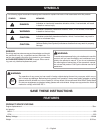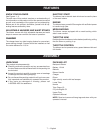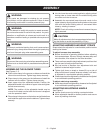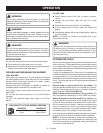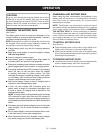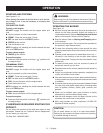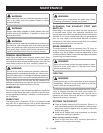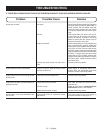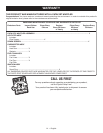
3 — English
GENERAL SAFETY RULES
WARNING:
Read and understand all instructions. Failure to follow
all instructions listed below may result in electric shock,
fire and/or carbon monoxide poisoning which will cause
death or serious personal injury.
READ ALL INSTRUCTIONS
For safe operation, read and understand all instructions
before using this product. Follow all safety instructions.
Failure to follow all safety instructions listed below, can
result in serious personal injury.
Do not allow children or untrained individuals to use this
unit.
Never start or run the engine inside a closed area; breath-
ing exhaust fumes can kill.
Wear eye protection which is marked to comply with ANSI
Z87.1 as well as hearing protection when operating this
equipment.
Keep all bystanders, children, and pets at least 50 feet
away.
A battery operated tool with integral batteries or a
separate battery pack must be recharged only with the
specified charger for the battery. A charger that may be
suitable for one type of battery may create a risk of fire
when used with another battery.
Use battery operated tool only with specifically designated
battery pack. Use of any other batteries may create a risk
of fire.
Use battery only with charger listed.
MODEL BATTERY PACK CHARGER
RY09600, RY09701 130269012 140295003
Wear heavy long pants, boots, and gloves. Do not wear
loose fitting clothing, short pants, jewelry of any kind, or
go barefoot.
Heavy protective clothing may increase operator fatigue,
which could lead to heat stroke. During weather that is
hot and humid, heavy work should be scheduled for early
morning or late afternoon hours when temperatures are
cooler.
To reduce the risk of injury associated with objects being
drawn into rotating parts, do not wear loose clothing,
scarves, neck chains, and the like. Secure long hair so it
is above shoulder level to prevent entanglement in any
rotating parts.
Do not operate this unit when you are tired, ill, or under
the influence of alcohol, drugs, or medication.
Do not operate in poor lighting.
Keep all parts of your body away from any moving parts
and all hot surfaces of the unit.
Wear a face filter mask in dusty conditions to reduce the
risk of injury associated with the inhalation of dust.
Check the work area before each use. Remove all ob-
jects such as rocks, broken glass, nails, wire, or loose
string which can be thrown or become entangled in the
machine.
Keep firm footing and balance. Do not overreach. Over-
reaching can result in loss of balance or exposure to hot
surfaces.
Never operate the unit without a spark arrestor screen;
this screen is located inside the muffler.
Product users on United States Forest Service land, and
in some states, must comply with fire prevention regula-
tions. This product is equipped with a spark arrestor;
however, other user requirements may apply. Check with
the federal, state, or local authorities in your area.
Before storing, allow the engine to cool.
Use only identical manufacturer’s replacement parts and
accessories. Failure to do so may cause poor performance
or possible injury.
Inspect the unit before each use for loose fasteners, fuel
leaks, etc. Replace damaged parts.
Do not touch area around the muffler or cylinder of the
unit, these parts get hot from operation.
It has been reported that vibrations from hand-held tools
may contribute to a condition called Raynaud’s Syndrome
in certain individuals. Symptoms may include tingling,
numbness, and blanching of the fingers, usually apparent
upon exposure to cold. Hereditary factors, exposure to
cold and dampness, diet, smoking, and work practices
are all thought to contribute to the development of these
symptoms. It is presently unknown what, if any, vibrations
or extent of exposure may contribute to the condition.
There are measures that can be taken by the operator to
possibly reduce the effects of vibration:
a) Keep your body warm in cold weather. When operating
the unit wear gloves to keep hands and wrists warm.
It is reported that cold weather is a major factor con-
tributing to Raynaud’s Syndrome.
b) After each period of operation, exercise to increase
blood circulation.
c) Take frequent work breaks. Limit the amount of
exposure per day.
d) Keep the tool well maintained, fasteners tightened,
and worn parts replaced.
If you experience any of the symptoms of this condition,
immediately discontinue use and see your physician about
these symptoms.



